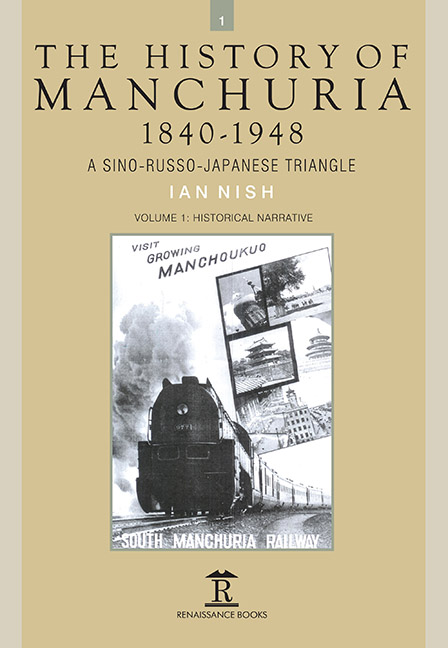Book contents
- Frontmatter
- Dedication
- Contents
- Preface
- Acknowledgements
- Name Conventions
- List of Abbreviations
- List of Maps
- Chapter One Manchuria and Russian Ambition, 1840s–1890s
- Chapter Two Sino-Japanese War and After, 1894–1900
- Chapter Three Prelude to the Russo-Japanese War, 1900–1905
- Chapter Four Railways, Reforms and Revolutions, 1906–1914
- Chapter Five Wartime Turmoil in Manchuria, 1915–1922
- Chapter Six Chang Tso-Lin’s Manchuria, 1922–28
- Chapter Seven Chinese Nationalism and Foreign Railways, 1929–1931
- Chapter Eight Lytton Commission in Manchuria, 1931–1932
- Chapter Nine Manchukuo: From Republic to Empire, 1933–1937
- Chapter Ten A Decade of Wars, 1938–1948
- Epilogue
- Map
- Select Bibliography
- Index
- Volume 2: Select Primary Sources
- Miscellaneous Frontmatter
- Dedication
- Miscellaneous Frontmatter
- Chapter 1 1840–1894
- Chapter 2 1895–1899
- Chapter 3 1900–1905
- Chapter 4 1905–1914
- Chapter 5 1915–1922
- Chapter 6 1922–1928
- Chapter 7 1929–1931
- Chapter 8 1931–1932
- Chapter 9 1933–1937
- Chapter 10 1938–1948
- Apendix Appeal by the Chinese Government
Chapter 8 - 1931–1932
Published online by Cambridge University Press: 18 November 2023
- Frontmatter
- Dedication
- Contents
- Preface
- Acknowledgements
- Name Conventions
- List of Abbreviations
- List of Maps
- Chapter One Manchuria and Russian Ambition, 1840s–1890s
- Chapter Two Sino-Japanese War and After, 1894–1900
- Chapter Three Prelude to the Russo-Japanese War, 1900–1905
- Chapter Four Railways, Reforms and Revolutions, 1906–1914
- Chapter Five Wartime Turmoil in Manchuria, 1915–1922
- Chapter Six Chang Tso-Lin’s Manchuria, 1922–28
- Chapter Seven Chinese Nationalism and Foreign Railways, 1929–1931
- Chapter Eight Lytton Commission in Manchuria, 1931–1932
- Chapter Nine Manchukuo: From Republic to Empire, 1933–1937
- Chapter Ten A Decade of Wars, 1938–1948
- Epilogue
- Map
- Select Bibliography
- Index
- Volume 2: Select Primary Sources
- Miscellaneous Frontmatter
- Dedication
- Miscellaneous Frontmatter
- Chapter 1 1840–1894
- Chapter 2 1895–1899
- Chapter 3 1900–1905
- Chapter 4 1905–1914
- Chapter 5 1915–1922
- Chapter 6 1922–1928
- Chapter 7 1929–1931
- Chapter 8 1931–1932
- Chapter 9 1933–1937
- Chapter 10 1938–1948
- Apendix Appeal by the Chinese Government
Summary
The chairman of the Provincial Government of Heilungkiang (Ma Chan-shan) to the Chinese Delegation at Geneva
[HEIHO,] April 14, 1932.HISTORY RECORDS THAT the Manchus and the Chinese have been assimilated for the last five hundred years. During this period the Manchus and the Chinese have lived together in peace, their civilization, politics, customs, language and religion becoming identical. Therefore, although in 1911 the Chinese overthrew the Manchu Dynasty and instituted a republican regime in its stead, there has not been the slightest enmity between the Chinese and the Manchus; besides, the terminology used in designating the difference of the two peoples has disappeared even from the language. These facts are known commonly to all people who know anything about Chinese affairs and are not the opinion of an individual. It is clear, therefore, the expressions “Chinese” and “Manchu” are merely of historical significance and have no value per se in relationships of the two peoples today in the sense that the Manchu is not a part of the Chinese people and Manchuria not a part of China. Yet the Japanese insist on capitalizing this historical difference in nomenclature and exploiting the same in order to alienate the different groups of the Chinese people and occupy our territory. It is astonishing to see in this 20th century that there are still such a disregard for international right and justice and such inhuman actions which cannot but disturb the peace of the Far East.
According to Article X of the Covenant of the League of Nations, the Members of the League undertake to respect and preserve as against external aggression the territorial integrity of all Members of the League. The provisions of the Nine Power Treaty signed in Washington guarantee to China her territorial and administrative integrity as well as the international policy known as the open door and equal opportunity relative to the Three Eastern Provinces. These are stumbling blocks to the Japanese in the way of their scheme to incorporate Manchuria as part of the Japanese Empire.
- Type
- Chapter
- Information
- The History of Manchuria, 1840-1948A Sino-Russo-Japanese Triangle, pp. 104 - 115Publisher: Amsterdam University PressPrint publication year: 2016

